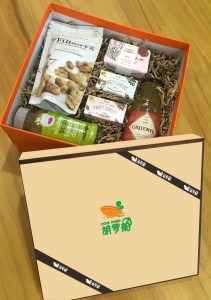It’ s a cut and dried truth that China has an overwhelming appetite for foreign goods. With immense strides forward in living standards, and increased recognition of foreign brands, Chinese consumers’ insatiable appetite for cross border commerce, or “Haitao” has fostered a plethora of e-commerce verticals–Ymatou, Metao, Hitao, Bolome, jostling for marketshare with larger players.
By now it’s hard to argue that Chinese shoppers more than enough options to get their Australian infant formula and Italian handbags. But these expat entrepreneurs disagree. They want to kick things up a notch and further unleash China’s penchant for exotic brands.
Cool Hobo

Cool Hobo is about a exploration of new European foods and the stories behind them. Imported food on the large cross border sites are still largely limited to big international names like Nestle or Danone.
Operating through WeChat web app, Cool Hobo delivers each month a box of 7 or eight assorted items -snacks, drinks and gourmet food–to subscribers’ doorsteps. The company believes that curious foodies as Chinese people are, they will naturally enjoy discovering niche items like chai coconut milk, pure birch water and beetroot energy bars.
The founders Flo and Loic, both French, feel there a lot of opportunity in the long tail of imported food. They aim to bring premium, boutique names from Europe to Chinese consumers that are progressively looking for quality and exotic tastes, while in the meantime helping small and midsize European food and beverage companies get a foothold in China.
“There are thousands of mid to small food brands, dreaming about the Chinese market, but it is too complicated to crack and difficult to communicate a solid brand image here. Consumers want it, but brands don’t know how to do it”, says Loic.
However, at price of 200 Rmb, Cool Hobo’s contents had better be pretty memorable for shoppers to keep coming back for more.
Trust Luxe

For years, sporting luxury items has been a way for the affluent to show off wealth in China. But when the receptionist girl fresh out of school is sporting a Louis Vuitton, women who have been carrying these brands for 15 years want something one of a kind, a statement of superior taste.
“The brands in malls over the past 15 years are largely the same, they have not kept up with the Chinese consumer who has acquired a taste for craftsmanship and items that make them feel more unique”, says co-founder of Trust Luxe Ricardo Ferrer.
Together with the Carmen Busquets, fashion pundit and creator of Net-a-Porter, the Trust Luxe team is introducing small but beautiful brands from Europe to China– the likes of handbags from Barbara Bonner and fine jewelry by Brazilian Designer Fernando Jorge.
Just like everyone else, small brands want in on the Chinese market, but they don’t want to be cheated in such a complicated market, or outrun by their own knock-offs. “They are all extremely protective about their brand, but because of the trust that Carmen Busquets’ name carries, we’ve almost never been turned down when we invite these brands to our platform” says Ricardo.
Trust Luxe is obviously catering to a paper thin slice of the market: the Fuerdai ( second generation rich), or older women from the upper-middle class. China’s market is complicated indeed, and getting customers to pay for a 10 thousand Rmb pair of earrings through a mobile web app, may prove difficult.
Group Mall

The “Tuan Gou” or group buy model has nearly ground to a halt, but Group Mall is planning to restore this natively Chinese strategy, selling imported foods. Group Mall offers weekly deals featuring a handful of heavily discount products, from live lobster and crabs, yak milk, Belgian ice cream, to truffle olive oil and lemon liquor.
Marco, the Italian founder of Group Mall was inspired by a personal pain point. Despite having worked with food importers for most of his time in China, he has had a hard time finding affordable imported food sold retail. “Brick-and-mortar imported food super markets mainly target higher income families. The mark up is so high in these shops that I ended up buying directly from importers” said Marco, revealing that the wholesale price is sometimes only a fourth of the price label in markets like Ole.
Tapping into relationships with more than 50 importers the platform gets hold of inventory at clearance prices because of warehouse relocation, because products are switching to new packaging, or simply nearing the end of their shelf life.
Though it is offering convenient and smart deals–unwanted inventory was previously grabbed by individual “vultures” to be scattered among small marts and shops–Group Mall is not exactly causing any large scale disruption per se. Just how much demand among the average Chinese consumer is still a big question mark, after all, the vast majority of Chinese don’t cook western food from scratch, so tomato paste, cheeses, pitted olives is hardly a necessity outside the expat community.
Image credit: Cool Hubo, Trust Luxe, Shutterstock

